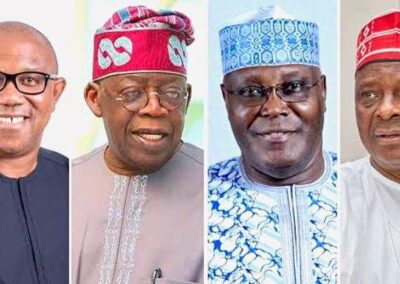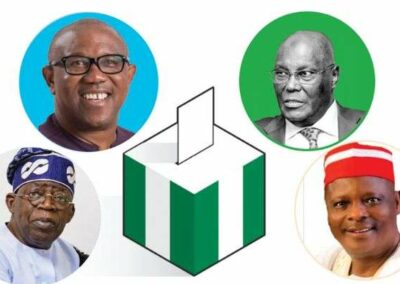It is barely one week to Nigeria’s presidential election. Universities and Polytechnics are already closing for three weeks to allow students to participate in the election. The Nigerian Professional Football League had been temporarily placed on hold until after the election. Other public and private institutions will also be going on a long three weeks break until the nation concludes the presidential and governorship elections.
While there are high hopes regarding the election, there are fears that it could make or mar the most populated country in Africa. What is unique about this year’s presidential election in Nigeria, who are the candidates, and what are the issues surrounding the polls? This report explains.
The candidates in the election
There are at least 18 candidates in the forthcoming presidential election in Nigeria. However, before the election, opinion polls suggest that there are three major candidates in the race. The fourth candidate, Musa Rabiu Kwankwanso, although having some influence, will likely not win the election but could cause some shake-up in the process. The following are the major presidential candidates.
Bola Ahmed Tinubu, the man who believes it is his turn to be President
Bola Tinubu is a Nigerian politician and accountant, born on March 29 1952. He served as a Senator representing Lagos West Senatorial District during the short-lived third Republic from 1992 to 1993.
On the country’s return to democracy, Tinubu became the governor of Lagos State after winning the 1999 governorship election by a wide margin. He won re-election in 2003 with a narrower margin. After 8 years as governor, the veteran politician continued to dominate Lagos State’s politics and has been described by some as a kingmaker, for being a major decider of who becomes the governor of the State. During a campaign to become the flagbearer of his party, which is also the party of the incumbent president Muhammadu Buhari, Tinubu boasted of singlehandedly making Buhari the winner of the 2015 election and eventually the 2019 election.
“If not me that led the war front, Buhari wouldn’t have emerged. He contested first, second and third time, but lost. He even said on television that he won’t contest again,” Tinubu said in the Yoruba language.
“But I went to his home in Katsina. I told him you would contest and win, but you won’t joke with the matters of the Yorubas. Since he has emerged, I have not been appointed minister. I didn’t get a contract,” he continued. “This time, it’s Yoruba’s turn and in Yorubaland, it’s my turn.”
The 70-year-old has been widely criticised for the speech, which he later said was quoted out of contest.
Lagos State witnessed significant growth during his time as Governor of the State, and he has been described by his supporters as the architect of modern-day Lagos. However, there have been disputes over his age, name, educational qualification, and most recently, allegations of drug-related offences.
Another issue of serious concern to many voters is Tinibu’s health. In some of his campaigns, the former governor has altered some unintelligible words, causing many to fear that he could be having mental decline with age. But none of these has stopped him from winning his party’s ticket for the election. Some opinion polls have placed him ahead of the other candidates while others have placed him in second place.
Atiku Abubakar, the serial contestant
Alhaji Atiku Abubakar was Vice President of Nigeria from 1999 to 2007. Before then, he contested to become the country’s president in the third republic, but he could not get the nomination of his party. Fast forward to 1999, he was elected Governor of Adamawa State before he was picked by President Olusegun Obasanjo to be his running mate in the presidential election, which he won.
Atiku fell out with his boss after the 2003 re-election and was pushed out of the ruling People’s Democratic Party. In his book, My Watch, Obasanjo described Atiku as corrupt, shameless and a blatant liar. During his time as vice president, many believed he was behind several decisions, including the privatisation of public companies, which has led to the total or partial collapse of most of them. He has been accused of selling most of these assets to political allies and close associates. He has promised to privatise most government assets when he wins next week’s presidential election.
Atiku, whom many believed was the favourite to succeed Obasanjo, contested the 2007 election under the Action Congress (AC) election but lost to former President Umaru Musa Yaradua, the favourite of his former boss.
He also contested for president in 2011, 2015, and 2019. It is unlikely that the 75-year-old would contest again should he lose this time. He has described himself as the Unifier, who has what it takes to unite the country that has divided across ethnic and religious lines.
Peter Obi, the man without the structure to win
Mr Peter Obi, a businessman and former governor of Anambra State, seems to be the only candidate saying what the youths want to hear. He has promised to move the country from a consuming nation to a producing nation. He has vowed to diversify the oil-dependent Nigerian economy and turn the uncultivated lands in Northern Nigeria into the new oil of the country. He has also promised to declare a war on the country’s epileptic power supply.
While the two other major candidates are facing calls for disqualification over corruption allegations, Obi has vowed to step down should anyone successfully prove beyond doubt that he was involved in any sort of corrupt practices. Most of the youths, especially in Southern Nigeria have queued behind the 61-year-old, seeing him as the only man that could rescue the dying nation. Most opinion polls have placed him ahead of the rest candidates, but there are arguments about whether he had the structure to win since his party is unpopular in Nigeria. In one week, that question would be answered.
Why the election is different from previous elections
The 2023 election in Nigeria is one of a kind. After it, there might not be anyone like it again. The following reasons make the election unique.
An election with three major candidates
Since Nigeria’s return to democratic rule in 1999, it has conducted six presidential elections. In all of these elections, like in most countries, there have been two major candidates. Electorates usually believe that one of the two leading candidates will win the election, hence there is no need to vote for others in smaller political parties. There have even been elections where there is only one major candidate.
However, the 2023 election is one with three major candidates. One in the ruling All Progressive Congress, another in the main opposition People’s Democratic Party, and a third in the Labour Party, which many consider a third force that will challenge the status quo. The question of who will become the winner remains unknown, with various projections and polls suggesting a tight first round and possibly a second ballot.
In Nigeria, to be elected president, a contestant must get the majority of votes and win at least 25 per cent of votes in 24 States, including the federal capital territory. If any of the candidates fail to reach the required threshold, a run-off election will be held between the first and second candidates.
Three candidates from the three major tribes
Unlike England, which belongs to the English people, Spain, which belongs to the Spanish people, Italy, which belongs to the Italians, Germany belonging to the Germans, and Finland, which belongs to the Finnish people, Nigeria does not belong to a particular ethnic group or tribe. In total, there are over 250 ethnic groups in Nigeria.
Of all of them, three are the most popular. They are the Hausa/Fulani, the Igbos, and the Yorubas. These tribes make up over 60% of the entire population in the country. All three ethnic groups have candidates in the forthcoming election.
Although everyone is Nigerian, African society often places tribe or ethnicity ahead of the nation. Hence the ethnicity of a candidate is considered during elections, sometimes more than competence.
“Elections in Nigeria are not necessarily about issues but about ethnicity, religion and regionalism,” a study conducted following the 2015 presidential election noted. “It is the first time in Nigeria’s recent history (Fourth Republic) that the election result has exposed the huge division between the Muslim north and Christian south.”
Each of the three major candidates is expected to win his geo-political zone, as most voters prioritise their ethnicity.
The turn of the South, but there is a Northerner
Although it is not entrenched in the country’s constitution, power in Nigeria rotates between the North and the South. What this means is that when a Northerner becomes a president in Nigeria and completes a two-term of eight years, a Southerner should become the next leader of the country. It was on that ground that incumbent President Jonathan was voted out of power in 2015, with many believing it was the turn of the North to produce a president.
President Muhammadu Buhari, a Northerner, will be completing 8 years as president on 29th May 2023. Ordinarily, a Southerner is expected to become the next president, and as the unwritten law demands, people from Northern Nigeria are not supposed to be involved in the contest.
Since Nigeria operates as a democracy, the 1999 constitution does not prohibit anyone from contesting, but the unwritten law is believed to ensure equity, fairness, and justice. Many people in Southern Nigeria feel it was wrong for former vice president Atiku Abubakar to enter the race when he stood by the principle of zoning in 2015 and 2019.
A Muslim-Muslim ticket
Apart from the country being divided across ethnic lines, Nigeria is divided almost equally across religious lines. The South is mostly dominated by Christians and the North by Muslims. Expectedly, when a presidential candidate is a Christian, he is expected to pick a Muslim running mate and vice versa.
However, the candidate of the ruling All Progressive Congress, Bola Ahmed Tinubu, has been described by some, especially Christians, as being insensitive to the religious diversity in the country for picking a Muslim running mate despite being a Muslim himself. The 71-year-old veteran politician has described his decision as a strategy to win the forthcoming election, saying it will help him win the majority of votes in the North.
Issues facing the next president
As Nigeria prepares for next week’s election, many have described the country as being in an existential crisis. Insecurity, massive corruption, and a huge debt await the next president. The voter turnout on Saturday could be on the high side, as many people believe the next four years are too long to risk it all. However, the buck now stops at the table of INEC, the country’s electoral umpire as the acceptability of the results will depend on how transparent, free and fair the election was.








0 Comments